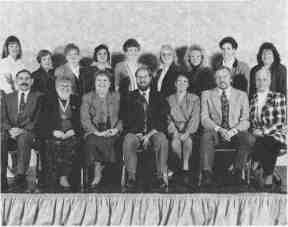The Case For Hiring A Manager/Administrator
By CAROL B. ZAR During the recent elections, a number of communities in Illinois held referenda concerning the hiring of managers and administrators for their governing bodies. In some cases, the referenda were passed and the governments will be seeking to hire a new staff member; in other cases the referenda were defeated and no such individual will be brought on board. Some Councils and Boards have made the decision to hire an administrator without holding referenda and have faced political flak because of their decision. Why is this such a controversial issue? What can a manager/administrator do for a community? Professional management adds the expertise which comes from having an individual trained in the field of local government participate in the running of the municipality. According to data gathered by the International City Management Association, two-thirds of U.S. cities with populations over 2500 now operate with a chief administrative officer in place. Managers have a variety of responsibilities. They organize and work with department heads, front line supervisors and technical staff to implement programs and deliver public services. They are knowledgeable about changing and expanding state and federal regulations, public finance and public budgeting. They have access to information about the latest trends in infrastructure improvements and economic development practices. Through their professional contacts, they share a wealth of information and experience about the successful operations of a municipal government. Professional administrators have the skills to take a problem or opportunity facing a community, research the options available for dealing with the situation, present the pros and cons of those options to the governing body, and then implement the final decision reached by the elected officials. They are able to engage in long-range planning which is necessary to the smooth functioning of today's community. They also have the time and expertise to oversee the day-to-day operations of the municipality. The elected officials, mayor and council, however, retain the responsibility for choosing the options and plans which best fit their community. If professional management simply lends knowledge and experience to municipal government, why is it controversial? First, there is a misconception that professional management requires or implies a change in the form of government. While there are approximately one hundred communities in Illinois operating under the city manager form of government, there are many others that employ an administrator but continue to operate as mayor-council governments. These range in size from the City of Rockford with over 130,000 population to the City of El Paso with only 2500. Clearly, it is not necessary to change the form of government to benefit from professional management or to be of any particular size. Second, there is apprehension that hiring an administrator dilutes the authority of the mayor and the council. Again, this is not the case. The mayor and council continue to have not only the authority but the responsibility to set the course for the city. They can rely on the administrator to provide them with information, to spell out choices, to develop alternate funding mechanisms, and. in general, to provide professional advice; but the mayor and the council must still provide the political will and leadership to get projects done and make the final decisions on how those projects and services will be funded. Third, communities fear that the addition of an administrator will substantially increase the cost of doing business. While an initial outlay for salary and benefits is, of course, necessary, in the long run the cost of doing business should be contained and the budget and finance experience which such an individual brings should allow the city to operate in a more efficient- financial manner. In addition, the administrator's knowledge of alternate funding sources and an understanding of the many options available should provide the community with a range of options for financing specific projects and services which might otherwise be overlooked. February 1995 / Illinois Municipal Review / Page 13 In a time when many communities are undergoing development pressures, having an individual on board with the education and experience to manage the day- to-day affairs of the city, to deal with developers and entrepreneurs in a prompt and professional way, and to assist the community in long range planning is a must. On the other hand, communities that are coping with a declining commercial, industrial, or even residential base can also benefit from the knowledge and expertise which professional management can provide in seeking ways to maintain a viable fiscal posture. Can a community afford a manager/administrator? Is it in the community's best interest to have such expertise? Many successful communities have responded with a resounding Yes! If you and your community are interested in more information about hiring an administrator or manager, feel free to contact the Illinois City Management Association Secretariat, Center for Governmental Studies, Northern Illinois University, DeKalb, IL 60115 or call Carol Zar at 815/753-0927. MUNICIPAL CLERKS OF ILLINOIS
The Municipal Clerks of Illinois elected their Board of Directors at their annual meeting, October 12, 1994, in Urbana. Officers and directors are: Front row left to right: Mell Smigielski (DuQuoin) District IX Director, Anita Carlton (Galesburg) Immediate Past President, Betty Henneman (Park Ridge) Vice President, Rick Goeckner (Effingham) President, Robin McClellan (Casey) Treasurer, Chuck Tokar (Chicago Ridge) Secretary, Kathy Dahlkamp (Lansing) District I Director. Back row: Cindy Lambin (Geneseo) Newsletter Editor, Marlene Williams (Skokie) Membership Chairman, Gale Simer (Centralia) District VIII Director, Marilyn Herbeck (Staunton) District VII Director, Janet Cooper (Danville) District VI Director, JoAnn Lambrecht (Moline) District V Director, Maureen HayesLeyva (Romeoville) District IV Director, Chris Ferguson (Harvard) District III Director, Carol Penning (Bolingbrook) District II Director. Page 14 / Illinois Municipal Review / February 1995
|Home|
|Search|
|Back to Periodicals Available|
|Table of Contents|
|Back to Illinois Municipal Review 1995|
|
|||||||||||||||

